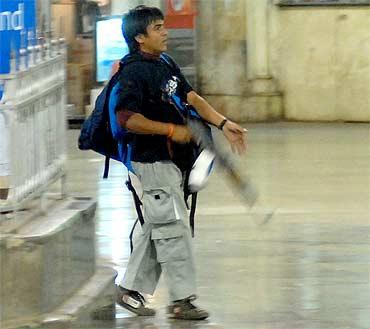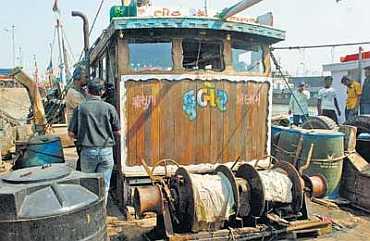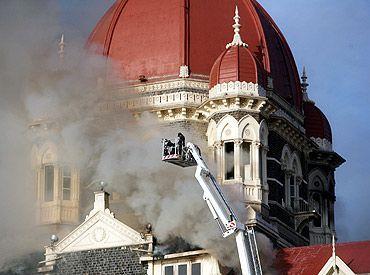 | « Back to article | Print this article |
26/11 diary reveals how the attack was 'premeditated'
Evidence in 26/11 Mumbai terror attack case involving Mohammad Ajmal Amir Kasab and nine slain terrorists clearly showed it to be a "pre-meditated" assault on the country's commercial capital by Pakistani terrorists, guided by their handlers from across the border, the Supreme Court was told on Thursday.
The prosecution said the recovery of a diary with contents in Urdu and the intercepts of telephonic conversation among the ten terrorists and their handlers in Pakistan established that the terror attack in Mumbai, in which 166 people were killed, was "pre-planned and pre-arranged."
"From the diary and intercepts of telephonic conversation between the terrorists and their handlers, three things are clear that the attack in Mumbai on November 26, 2008 was pre-meditated involving ten terrorists who were from Pakistan," former Solicitor General Gopal Subramaniam and Special Public Prosecutor Ujjwal Nikam told a bench of justices Aftab Alam and C K Prasad.
Click NEXT to read further...
For Rediff Realtime News click here
26/11 diary reveals how the attack was 'premeditated'
Subramaniam said it was disclosed from the diary which was recovered from the boat, Kuber, used by the terrorists to reach Mumbai, that they had come together and on reaching the city, they got divided into five groups with specific targets.
"This diary clearly proves that the ten terrorists had come in a group and attacked Mumbai. They were from Pakistan. It was a pre-planned and pre-arranged attack as after reaching Budhawar Park they divided themselves into five groups and attacked their respective targets," the Maharashtra government counsel said while seeking the apex court's endorsement to the death sentence awarded to 24-year-old Kasab, the sole convict in 26/11 Mumbai terror attack.
The prosecution said on reaching Budhawar Park, Kasab and other Lashkar-e-Tayiba terrorist Abu Ismaile took a taxi and proceeded towards Chhatrapati Shivaji Terminus railway station which bore the major brunt of their design.
26/11 diary reveals how the attack was 'premeditated'
Subramaniam said while proceeding towards the CST, Kasab planted bomb beneath the driver seat, which exploded after they alighted from the taxi on reaching their destination. He said Kasab and his associate indulged in indiscriminate firing at the CST, killing 52 people.
The prosecution said while the attack was launched at the Hotel Taj at the Gateway of India, the terrorists were interacting with their Pakistani handlers and the intercepted conversation clearly showed that they (handlers) asked them (terrorists) as to "why they did not sink the Kuber boat".
Subramaniam said the Pakistani handlers also sought confirmation about the killing of the navigator of Kuber, Amar Singh Solanki, who was beheaded by Kasab.
26/11 diary reveals how the attack was 'premeditated'
The diary also disclosed that Kasab was known by the name Mujaheed to other terrorists. Further, the premeditated attack was clear from the diary in which references have been made about the longitude and latitude relating to the location of Mumbai and Karachi, they said.
The Maharashtra government had on Wednesday said the arrest of Kasab had proven crucial as he disclosed that the conspiracy in 26/11 Mumbai terror attack case was hatched in Pakistan. He has pleaded with the Supreme Court to commute his death sentence to life imprisonment.
The apex court had on October, 10 last year stayed the death sentence of Kasab.




